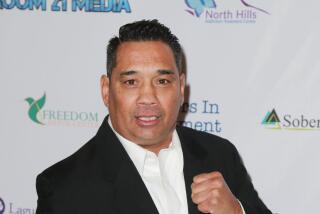High Court Imposes Broad Responsibility on Pension Trustees
SAN FRANCISCO — Saying pension fund trustees must protect workers diligently, the state Supreme Court on Monday imposed a broad responsibility on trustees to make clear to workers that they are entitled to lifelong payments if they are permanently disabled.
The case involves a former Santa Barbara County employee, William T. Hittle, who hurt his back in a 1977 fall while alighting from a truck after two months on the job as a driver in the Department of Public Works. By withdrawing the $187 he had paid into the disability fund, he gave up his right to apply for disability retirement pay, a lower court had ruled.
By a 6-1 vote, the Supreme Court said the Santa Barbara County treasurer who was in charge of the pension fund had failed to adequately inform Hittle that he could collect up to half his monthly pay by applying for disability retirement.
The treasurer had told Hittle in writing, “If you have filed or intend to file for disability retirement, you should not withdraw the ($187).”
However, the Supreme Court ruled that that was “tantamount to the misrepresentation and concealment” that are prohibited by laws governing pension funds.
“Experience tells us that an informed individual would not knowingly choose a reimbursement of $187.49 . . . rather than seek to obtain an annual allowance equal to one-half of his regular compensation for the remainder of his life,” the court said in an opinion by Justice Cruz Reynoso.
Pointing to previous rulings that pension fund operators must protect the rights of workers who pay into the funds, Reynoso said, “Courts must be vigilant in protecting the rights of the pensioner against powerful and distant administrators.”
The court said it did not want to “impose unreasonable obligations” on pension fund trustees, but it recommended that they rewrite forms to spell out more clearly the options available to injured workers.
Dissenting Justice Malcolm Lucas said evidence did not warrant reversing the Superior Court judge who had ruled for the county.
“The importance is that this applies to all sorts of employment contracts,” said James Christiansen, Hittle’s lawyer. “The employer has a duty to deal fairly with the employee. And the cases are legion where the employee has been given the dirty end of the stick.”
Santa Barbara County Counsel Kenneth L. Nelson said he is uncertain of the effects of the ruling. (Hittle vs. Santa Barbara County Employees Retirement Assn., L.A. 31931).
In another ruling, the court by a 5-1 vote held that an 11-year-old girl identified only as Michelle W., and her stepfather, Donald R., did not have the right to determine the girl’s biological father.
The San Diego case began in the mid-1970s, when Michelle’s mother and her then-husband, Ronald W., were having marital problems. The mother became pregnant as a result of an affair with Donald R. and then gave birth to Michelle. The law, however, assumes that the child’s father was the then-husband, the court noted.
Five years later, the mother, Judith, divorced Ronald W. and married Donald R.
However, Ronald W., who supported the child financially and emotionally during her first five years, continued seeing the child and helped with support payments.
Then in 1981, Donald R. went to court seeking to discover the identity of the girl’s father, a move opposed by Ronald W.
Reversing a court of appeal ruling, the high court, in another opinion by Reynoso said: “We find that the public interest in protecting the family unit and promoting familial stability outweighs Donald R.’s interest.”
The opinion added, “Given the facts that Michelle has a legal father and that he opposes this attempt to have Donald R. declared the biological father, we are unpersuaded that a judicial juggling of Michelle’s family relationships is warranted by her abstract interest in establishing paternity.”
Robert P. Dahlquist, lawyer for Ronald W., said his client had feared that he would lose visitation rights if he were deemed not to be the girl’s biological father.
The girl’s parentage also is important, because if the mother divorced her second husband, Donald R., she then would have an almost absolute right to custody. And if the mother should die, the biological father would win custody.
Chief Justice Rose Elizabeth Bird dissented, saying, “by denying the opportunity to establish that Donald R. is Michelle’s legal father, the majority assure that their relationship stands on a shaky legal foundation.” (Michelle W. vs. Ronald W. L.A. 31758).
More to Read
Sign up for Essential California
The most important California stories and recommendations in your inbox every morning.
You may occasionally receive promotional content from the Los Angeles Times.










